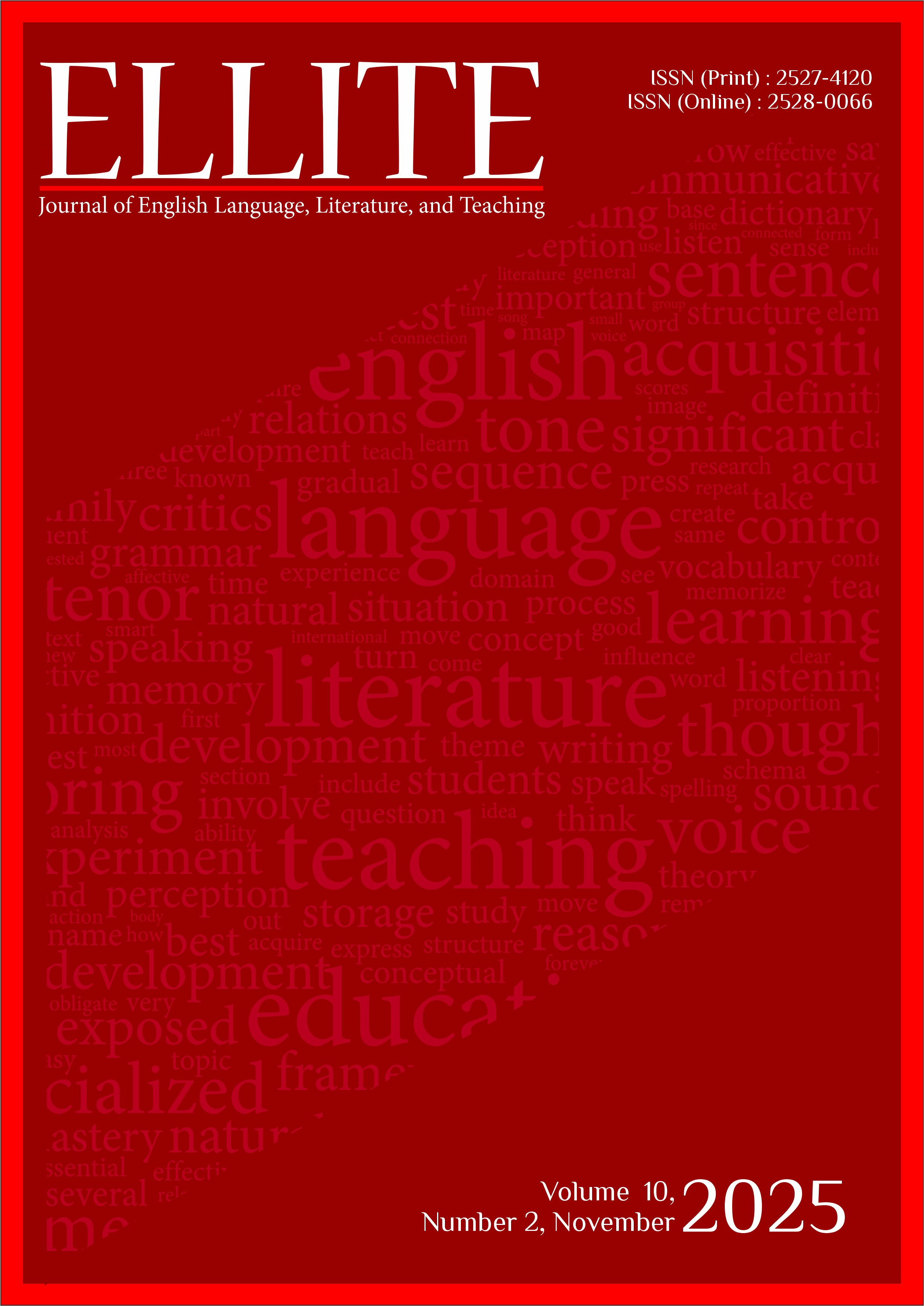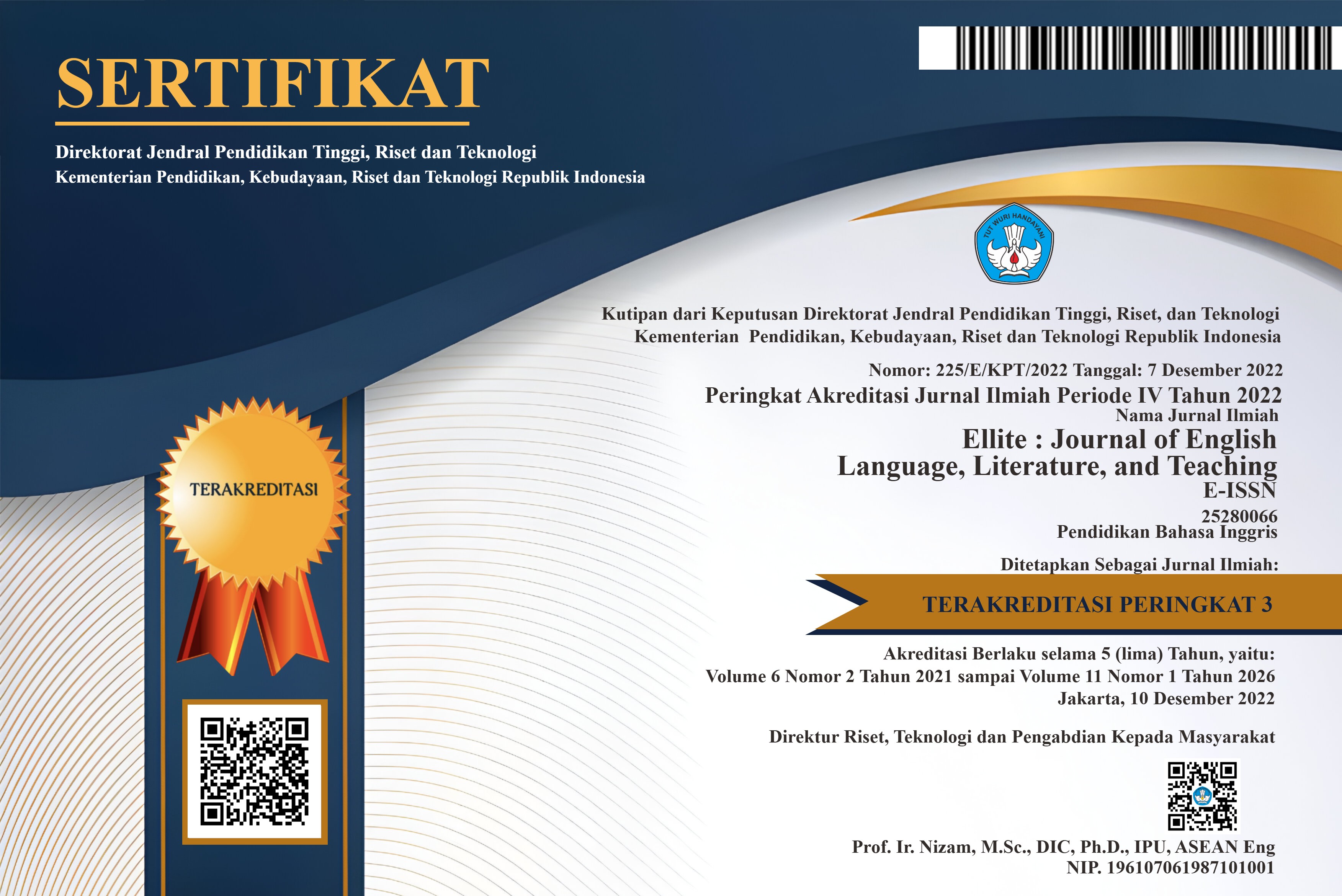Integrating Contextual Learning and Digital Media to Boost English Language Skills
DOI:
https://doi.org/10.32528/ellite.v10i2.4014Keywords:
contextual learning, English language teaching, place-based education, vlogging, language proficiencyAbstract
This study examines the impact of utilizing local tourist sites as a contextual medium to enhance English language learning through student-created promotional videos produced in a vlogger style. Conducted with 34 senior high school students from MAN 1 Aceh Tengah, Indonesia, this research employs a mixed-methods approach, combining quantitative data from pre- and post-test English proficiency scores and qualitative insights from student and teacher interviews. The quantitative data analysis involved paired sample t-tests, revealing a significant improvement in students' English proficiency, with post-test scores showing an average increase of 11.5 points compared to pre-test scores (p < 0.001). The qualitative thematic analysis highlighted several critical outcomes: students experienced greater motivation, enjoyment, and increased self-confidence in using English due to authentic interactions during visits to tourist sites. Additionally, the project fostered essential 21st-century skills such as collaboration, creativity, and digital literacy, enhancing overall student engagement and language acquisition. Teachers also expressed positive perceptions, noting the method's effectiveness in connecting theoretical learning to real-world contexts. The findings indicate that using local contexts and student-led digital projects can bridge classroom learning and real-world language use, offering practical insights for educators seeking innovative ways to enhance English proficiency in Indonesian-like settings.
References
Adzkiya N. I. Rahman, & Ekkayokkaya, M. (2024). The use of contextual teaching and learning approach on students’ analytical exposition writing skills. Indonesian Journal of Applied Linguistics, 13(3), 746–757. DOI: 10.17509/ijal.v13i3.66955
Andiappan, S., Goh, H. S., & Soo, R. S. (2022). The use of vlogging to enhance speaking performance of ESL students in a Malaysian secondary school. Teaching English with Technology, 22(1), 23–39.
Hassan, R. H. (2023). Educational vlogs: A systematic review. SAGE Open, 13(1), 1–12. DOI: 10.1177/21582440231152403
Fitria, T. N. (2022). Making an English vlog project: Students’ perceptions and their problems. Acuity: Journal of English Language Pedagogy, Literature, and Culture, 7(1), 77–87. DOI: 10.35974/acuity.v7i1.2535
Pratama, A., & Sumardi, M. S. (2022). Contextual teaching and learning using local content material on students’ reading comprehension at a junior high school in Indonesia. SALEE: Study of Applied Linguistics and English Education, 3(2), 184–194. DOI: 10.35961/salee.v3i2.494
Salazar Jaramillo, P., & Espejo Malagón, Y. (2019). Teaching EFL in a rural context through place-based education: Expressing our place experiences through short poems. European Journal of Sustainable Development, 8(3), 73–80. DOI: 10.14207/ejsd.2019.v8n3p73
Yusyac, R., Muslem, A., & Yasin, B. (2021). Using contextual teaching and learning (CTL) approach to improve students’ speaking ability. English Education Journal, 12(3), 459–475. DOI: 10.24815/eej.v12i3.19189
Downloads
Published
Issue
Section
Categories
License
Copyright (c) 2025 Ranti Maulya, Desi Purnama Sari, Barep Sarinauli, Kamarullah Kamarullah, Sabariah Sabariah

This work is licensed under a Creative Commons Attribution 4.0 International License.







